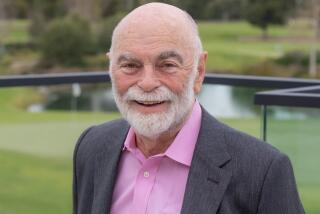Agent testifies in ‘Sahara’ trial
- Share via
A New York literary agent testified Monday that Denver multibillionaire Philip Anschutz set up a tag-team negotiation that led Anschutz to award author Clive Cussler extraordinary approval rights over the movie “Sahara.”
Peter Lampack, Cussler’s agent for 38 years, was the first witness to take the stand in the legal battle between Anschutz’s Crusader Entertainment and Cussler over the box-office flop.
Lampack said the industrialist’s partner, Howard Baldwin, arranged the June 2000 meeting at a boardroom inside Anschutz’s Denver office tower.
Anschutz “was just putting his toes into the entertainment field,” Lampack said. “This was sort of a learning curve for him.”
Anschutz, 67, had earned a fortune in oil and gas, railroads, telecommunications and real estate. He now controls Regal Entertainment Group, the nation’s largest chain of movie theaters, and Anschutz Film Group, a production company whose biggest hit, “The Chronicles of Narnia,” has earned more than $1 billion in revenue.
Lampack said that at the Denver meeting, Anschutz tried to low-ball Cussler by offering less than the $30 million the bestselling author was seeking for the film rights to his popular Dirk Pitt adventure series.
When Lampack refused, Anschutz and Baldwin escorted Cussler to a nearby office building to show off the billionaire’s extensive Western art collection.
“It became apparent to me that Philip Anschutz and Howard Baldwin taking Cussler out of the room was simply a ploy,” Lampack testified before being cut off by attorney Bertram Fields, who represents Cussler.
Lampack said he was left alone with about half a dozen Anschutz representatives to work out an agreement.
An entertainment lawyer for Anschutz, William J. Immerman, “tried to dilute the absolute, unconditional approvals” demanded by Cussler, Lampack said.
“We were not going to enter into any deal without those absolute approvals,” Lampack testified. “As far as I was concerned, that negotiation was finished.”
Cussler had vowed never again to allow Hollywood to make a movie from one of his Pitt books after his “Raise the Titanic” became a box-office disaster in 1980.
Cussler gave his agent the go-ahead to talk with Baldwin, who later brought in Anschutz as the principal financier.
Throughout the discussions, Cussler had insisted on retaining complete control over any Pitt screenplays, Lampack said. Such approvals are often granted to directors and powerful actors but rarely to authors.
At the Denver meeting, Anschutz and Baldwin returned with Cussler to the boardroom after touring the art exhibit for about 90 minutes, Lampack said. Baldwin then inquired about the discussions.
“I said, ‘This negotiation is over,’ ” Lampack recalled. Baldwin “literally turned white. I thought he was going to fall over.”
Anschutz urged all sides to keep talking, Lampack said. After hours of negotiations, Anschutz and Cussler struck a compromise: Anschutz’s film company would pay $10 million per book for the rights to two Cussler novels. The author would get “sole and absolute discretion” over the first picture and consulting approval rights over subsequent films.
“Sahara,” starring Matthew McConaughey and Penelope Cruz, was released in spring 2005 and has lost about $105 million to date.
More to Read
The biggest entertainment stories
Get our big stories about Hollywood, film, television, music, arts, culture and more right in your inbox as soon as they publish.
You may occasionally receive promotional content from the Los Angeles Times.










